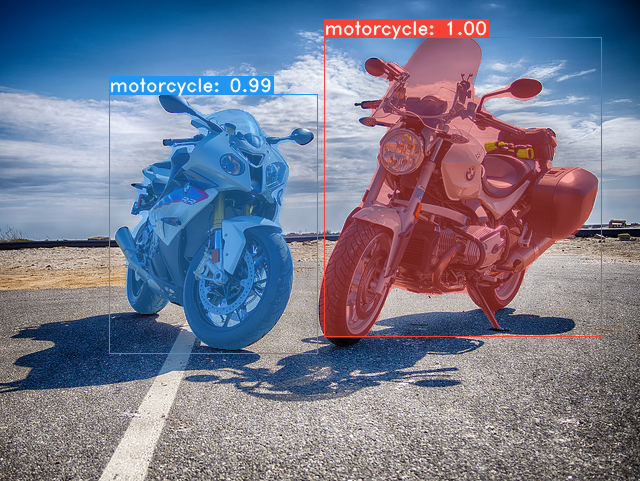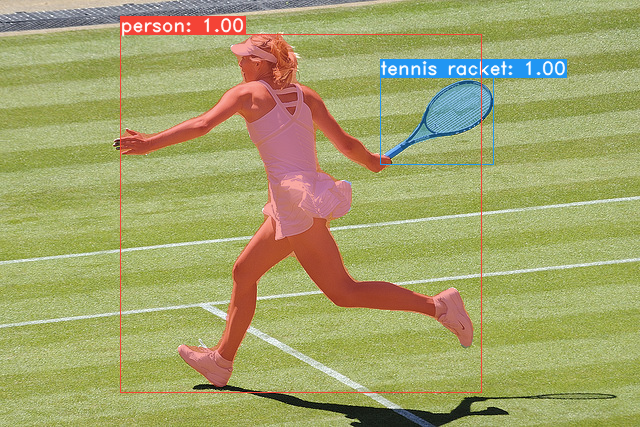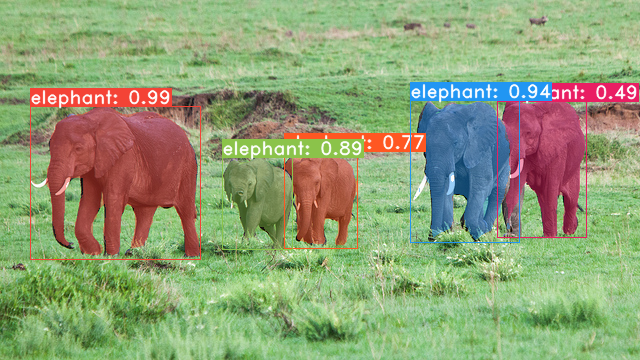██╗ ██╗ ██████╗ ██╗ █████╗ ██████╗████████╗
╚██╗ ██╔╝██╔═══██╗██║ ██╔══██╗██╔════╝╚══██╔══╝
╚████╔╝ ██║ ██║██║ ███████║██║ ██║
╚██╔╝ ██║ ██║██║ ██╔══██║██║ ██║
██║ ╚██████╔╝███████╗██║ ██║╚██████╗ ██║
╚═╝ ╚═════╝ ╚══════╝╚═╝ ╚═╝ ╚═════╝ ╚═╝
A simple, fully convolutional model for real-time instance segmentation. This is the code for our paper, and for the forseeable future is still in development.
Here's a look at our current results for our base model (33 fps on a Titan Xp and 29.8 mAP on COCO's test-dev):
- Set up a Python3 environment.
- Install Pytorch 1.0.1 (or higher) and TorchVision.
- Install some other packages:
# Cython needs to be installed before pycocotools pip install cython pip install opencv-python pillow pycocotools matplotlib - Clone this repository and enter it:
git clone https://github.com/dbolya/yolact.git cd yolact - If you'd like to train YOLACT, download the COCO dataset and the 2014/2017 annotations. Note that this script will take a while and dump 21gb of files into
./data/coco.sh data/scripts/COCO.sh
- If you'd like to evaluate YOLACT on
test-dev, downloadtest-devwith this script.sh data/scripts/COCO_test.sh
As of April 5th, 2019 here are our latest models along with their FPS on a Titan Xp and mAP on test-dev:
| Image Size | Backbone | FPS | mAP | Weights |
|---|---|---|---|---|
| 550 | Resnet50-FPN | 42.5 | 28.2 | yolact_resnet50_54_800000.pth |
| 550 | Darknet53-FPN | 40.0 | 28.7 | yolact_darknet53_54_800000.pth |
| 550 | Resnet101-FPN | 33.0 | 29.8 | yolact_base_54_800000.pth |
| 700 | Resnet101-FPN | 23.6 | 31.2 | yolact_im700_54_800000.pth |
To evalute the model, put the corresponding weights file in the ./weights directory and run one of the following commands.
# Quantitatively evaluate a trained model on the entire validation set. Make sure you have COCO downloaded as above.
# This should get 29.92 validation mask mAP last time I checked.
python eval.py --trained_model=weights/yolact_base_54_800000.pth
# Output a COCOEval json to submit to the website or to use the run_coco_eval.py script.
# This command will create './results/bbox_detections.json' and './results/mask_detections.json' for detection and instance segmentation respectively.
python eval.py --trained_model=weights/yolact_base_54_800000.pth --output_coco_json
# You can run COCOEval on the files created in the previous command. The performance should match my implementation in eval.py.
python run_coco_eval.py
# To output a coco json file for test-dev, make sure you have test-dev downloaded from above and go
python eval.py --trained_model=weights/yolact_base_54_800000.pth --output_coco_json --dataset=coco2017_testdev_dataset# Display qualitative results on COCO. From here on I'll use a confidence threshold of 0.3.
python eval.py --trained_model=weights/yolact_base_54_800000.pth --score_threshold=0.3 --top_k=100 --display# Run just the raw model on the first 1k images of the validation set
python eval.py --trained_model=weights/yolact_base_54_800000.pth --benchmark --max_images=1000# Display qualitative results on the specified image.
python eval.py --trained_model=weights/yolact_base_54_800000.pth --score_threshold=0.3 --top_k=100 --image=my_image.png
# Process an image and save it to another file.
python eval.py --trained_model=weights/yolact_base_54_800000.pth --score_threshold=0.3 --top_k=100 --image=input_image.png:output_image.png
# Process a whole folder of images.
python eval.py --trained_model=weights/yolact_base_54_800000.pth --score_threshold=0.3 --top_k=100 --images=path/to/input/folder:path/to/output/folder# Display a video in real-time
# I have to work out the kinks for this one. Drawing the frame takes more time than executing the network resulting in sub-30 fps :/
python eval.py --trained_model=weights/yolact_base_54_800000.pth --score_threshold=0.3 --top_k=100 --video=my_video.mp4
# Process a video and save it to another file.
python eval.py --trained_model=weights/yolact_base_54_800000.pth --score_threshold=0.3 --top_k=100 --video=input_video.mp4:output_video.mp4As you can tell, eval.py can do a ton of stuff. Run the --help command to see everything it can do.
python eval.py --help- To train, grab an imagenet-pretrained model and put it in
./weights. - Run one of the training commands below.
- Note that you can press ctrl+c while training and it will save an
*_interrupt.pthfile at the current iteration. - All weights are saved in the
./weightsdirectory by default with the file name<config>_<epoch>_<iter>.pth.
- Note that you can press ctrl+c while training and it will save an
# Trains using the base config with a batch size of 8 (the default).
python train.py --config=yolact_base_config
# Trains yolact_base_config with a batch_size of 5. For the 550px models, 1 batch takes up around 1.5 gigs of VRAM, so specify accordingly.
python train.py --config=yolact_base_config --batch_size=5
# Resume training yolact_base with a specific weight file and start from the iteration specified in the weight file's name.
python train.py --config=yolact_base_config --resume=weights/yolact_base_10_32100.pth --start_iter=-1
# Use the help option to see a description of all available command line arguments
python train.py --helpIf you use YOLACT or this code base in your work, please cite
@article{bolya-arxiv2019,
author = {Daniel Bolya and Chong Zhou and Fanyi Xiao and Yong Jae Lee},
title = {YOLACT: {Real-time} Instance Segmentation},
journal = {arXiv},
year = {2019},
}
For questions about our paper or code, please contact Daniel Bolya.


